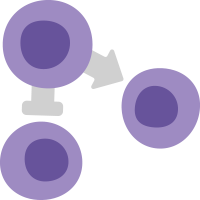
Immune Regulation News
Immune Regulation News is an online resource covering research into the regulation, suppression, and modulation of the immune system.
Targeting the Dendritic Cell-Secreted Immunoregulatory Cytokine CCL22 Alleviates Radioresistance
[Clinical Cancer Research] Transcriptomics and high dimensional flow cytometry revealed changes in murine tumor dendritic cells that not only mediated Treg infiltration after radiotherapy, but were associated with worse survival in human cancer datasets.
Biomimetic Nanodrug Blocks CD73 to Inhibit Adenosine and Boosts Antitumor Immune Response Synergically With Photothermal Stimulation
[Journal Of Nanobiotechnology] The release of α, β-Methyleneadenosine 5′-diphosphate suppressed the adenosine generation via CD73 blockade, alleviating the impairment of adenosine to dendritic cells and suppressing regulatory T cells, and synergically stimulated the activity of T cells.
ScRNA-Seq Reveals Novel Immune-Suppressive T Cells and Investigates CMV-TCR-T Cells Cytotoxicity Against GBM
[Journal For Immunotherapy Of Cancer] Investigators highlighted the interaction between bipositive TAMs or cancer cells and T cells was predominantly focused on FXYD6+ T cells rather than regulatory T cells, whereas, FXYD6+ T cells were further identified as a group of novel immunosuppressive T cells.
T Cell Characteristics Impact Response and Resistance to T Cell-Redirecting Bispecific Antibodies in Multiple Myeloma
[Clinical Cancer Research] The anti-multiple myeloma (MM) activity of teclistamab and talquetamab was evaluated in bone marrow (BM) samples from MM patients. T cell phenotype and function were assessed in BM/peripheral blood samples obtained from MM patients who were treated with these bispecific antibodies.
YTHDF1 Regulates Immune Cell Infiltration in Gastric Cancer via Interaction With p53
[Experimental And Therapeutic Medicine] Researchers evaluated the roles of YTH N6‑methyladenosine RNA binding protein 1 (YTHDF1) and p53 in regulating the tumor microenvironment in gastric cancer. Genetic alterations in the YTH domain family were analyzed using the cBioPortal database.
TYM-3-98, a Novel Selective Inhibitor of PI3Kδ, Demonstrates Promising Preclinical Antitumor Activity in B-Cell Lymphomas
[Life Sciences] In vivo, TYM-3-98 showed good pharmaceutical properties and remarkably reduced tumor growth in a human lymphoma xenograft model and a mouse lymphoma model.
Up-Regulated PLA2G10 in Cancer Impairs T Cell Infiltration to Dampen Immunity
[Science Immunology] Scientists identified a role for phospholipase A2 group 10 (PLA2G10) protein in T cell exclusion. They implicated a role for PLA2G10 in T cell exclusion from tumors and suggests a potential target for cancer immunotherapy.
PolyU Collaborates With Axis Therapeutics to Establish Joint Laboratory for Immunotherapy
[Hong Kong Polytechnic University (EurekAlert!)] The Hong Kong Polytechnic University has entered into a formal collaboration with Axis Therapeutics to foster cancer immunotherapy research and development, with the aim of improving cancer treatment for patients in Hong Kong.
Regulatory Role of CD39 and CD73 in Tumor Immunity
[Future Oncology] Investigators focus on the role of CD39 and CD73 in immune response and malignant progression, including the expression of CD39 within the tumor microenvironment and its relationship to immune effector cells, and its role in antigen presentation.
B Cells and Atherosclerosis: A HIV Perspective
[Journal of Cellular Physiology] The authors review the multifaceted functions of B cells in atherosclerosis, with a specific focus on HIV. Unique to atherosclerosis is the pivotal role of natural antibodies, particularly those targeting oxidized epitopes abundant in modified lipoproteins and cellular debris.
Dr. Ashley Nelson Receives Hartwell Foundation Individual Biomedical Research Award
[Weill Cornell Medicine] Dr. Ashley Nelson has received a 2023 Hartwell Individual Biomedical Research Award from The Hartwell Foundation. The award provides $100,000 direct cost support per year for three years and designation as a Hartwell Investigator.
QDPR Deficiency Drives Immune Suppression in Pancreatic Cancer
[Cell Metabolism] Scientists demonstrated that the deficiency of quinoid dihydropteridine reductase (QDPR), a critical enzyme regulating biopterin metabolism, caused metabolite dihydrobiopterin (BH2) accumulation and decrease the ratio of tetrahydrobiopterin to BH2 in pancreatic ductal adenocarcinomas.
For over a decade, Immune Regulation News has been keeping the scientific community up-to-date with the latest research and reviews related to immune regulation. Key research areas covered include the roles of regulatory T cells (Treg cells) in autoimmunity and self-reactivity, as well as immune response to disease, transplantation and cancer. We also provide vital updates on the latest jobs and upcoming events in the field of immunology.

 Cancer Stem Cell News
Cancer Stem Cell News Cell Therapy News
Cell Therapy News Dermal Cell News
Dermal Cell News Endothelial Cell News
Endothelial Cell News ESC & iPSC News
ESC & iPSC News Extracellular Matrix News
Extracellular Matrix News Hematopoiesis News
Hematopoiesis News Hepatic Cell News
Hepatic Cell News Human Immunology News
Human Immunology News Immune Regulation News
Immune Regulation News
 Intestinal Cell News
Intestinal Cell News Mammary Cell News
Mammary Cell News Mesenchymal Cell News
Mesenchymal Cell News Muscle Cell News
Muscle Cell News Neural Cell News
Neural Cell News Organoid News
Organoid News Pancreatic Cell News
Pancreatic Cell News Prostate Cell News
Prostate Cell News Pulmonary Cell News
Pulmonary Cell News
